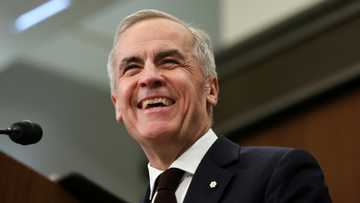Canada PM under fire for alleged climate U-turn

Source: AFP
Critics accuse Canadian Prime Minister Mark Carney of betraying the fight against climate change.
Others say he is facing reality and has no choice but boost polluting sectors that are vital to an economy being punished by US President Donald Trump's trade war.
But there is no dispute that since replacing former prime minister Justin Trudeau in March Carney has repositioned his Liberal Party on the environment.
Immediately after taking office, Carney scrapped Trudeau's unpopular carbon tax on individuals.
He then launched a Major Projects Office to fast-track initiatives he said would strengthen Canada's economic sovereignty, creating a bulwark against the impacts of Trump's tariffs.
Mining and natural gas projects -- criticized by some environmental advocates -- were among the early picks.
But the most dramatic development came on Thursday, when Carney struck a deal with the conservative-led energy-producing Alberta province to advance a new oil pipeline, while increasing overall oil and gas production.
"Canada and Alberta are striking a new partnership to build a stronger, more sustainable, and more independent Albertan and Canadian economy," Carney said.
"We will make Canada an energy superpower, drive down our emissions and diversify our export markets.”
The deal marked a clear pivot for Carney's Liberal Party and a departure from the policies that defined Trudeau's decade in power.
Alberta Premier Danielle Smith, who loathed Trudeau's policies, said this month that "the tone of federal government has done a 180 in the last year."
Steven Guilbeault, a member of Carney's cabinet, who was also Trudeau's environment minister, agreed.
He resigned Thursday, hours after the pipeline deal was signed.
Guilbeault said he entered politics "to champion the fight against climate change," but that key green policies he implemented with Trudeau were being "dismantled" under Carney.
Climate policy 'erosion'?
Carney, a former central banker, worked on climate issues before joining politics in January, but has emphasized market-driven solutions to environmental challenges.
In 2019, he became a UN envoy focused on mobilizing public and private finance to help achieve the goals of the Paris Accords.
He then joined the massive Canadian multinational firm Brookfield, steering private capital to aid climate action.
The Alberta pipeline plan is in its infancy and may never move forward.
But Carney's memorandum of understanding with Alberta to advance an initiative that involves piping bitumen to Canada's northwest Pacific coast and building a massive port to accommodate oil tankers has drawn outrage.
Carney said the plan could be a win-win.
Increased oil exports to Asia would reduce Canada's economic dependence on an unreliable United States, he said.
And, he stressed, the deal requires oil companies to pay a steep industrial carbon tax, which could help fund cleaner energy sources, while the impact of rising emissions would be offset through carbon capture -- a controversial technology.
Sierra Club Canada's communications chief, Conor Curtis, told AFP there has been an "erosion of climate policy," under the new Liberal government.

Source: AFP
"A new oil pipeline is not necessary. We are in the middle of a global transition to renewable energy," he said in an interview before Thursday's signing.
'Profound disruptions'
Tim McMillan, the former president of the Canadian Association of Petroleum Producers, said Carney had no choice but to embrace the oil sector.
"After 10 years of cancelled projects and lowering GDP per capita and standards of living in Canada, we're at a point, especially with the US tariff threats, that Canada needs to look at our strengths," McMillan told AFP.
"Oil and gas are at the top of that list."
Even Guilbeault, a prominent environmental activist before entering politics, acknowledged Carney was in a tough spot, conceding that Trump had triggered "profound disruptions" in Canada's key economic relationship.
"Despite this difficult economic context, I remain one of those for whom environmental issues must remain front and center," he said.
Source: AFP





